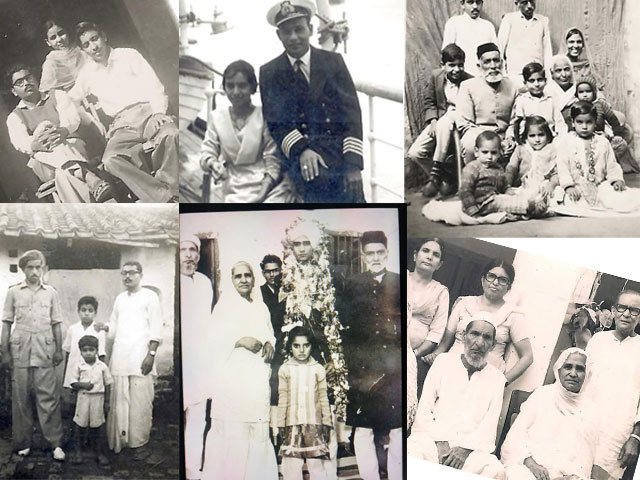
KARACHI:
For most of us, 14th August marks a day of freedom. A day where we feel alive, sense patriotism and exude passion for this country we live in. "There's no power on Earth that can undo Pakistan," Quaid-e-Azam Muhammad Ali Jinnah had once said.
We've achieved this beloved motherland after uncountable sacrifices and unmatched amount of bloodshed and suffering by Muslims living in India. "That freedom can never be attained by a nation without suffering and sacrifice has been amply borne out by the recent tragic happenings in this subcontinent," Jinnah had stated... and rightly so.
PHOTO: RIDA LODHI
I sat down with few eyewitnesses to gather their account of happenings of 1947. Here are their stories:
"I was 13 when Pakistan was formed," said a now 84-year-old Afroz Begum. "My husband was asked to move to Pakistan fifteen days after we got married on December 4, 1947. I, then migrated via train six months later in June 1948. We entered through Sindh."
PHOTO: RIDA LODHI
"Most Muslims left all their properties... their homes back in India. So did we. We came to Pakistan, empty-handed. In the beginning, we used to live in a rental home, provided to my husband by the government," she continued.
"But, it was a drastically different to how we lived in India. You see, back in united India, we used to live in communities with Muslim majority and our family home was in Barelli. We had huge houses, with servants and what not but when we migrated, all those luxuries were left behind. I learned to do all house chores, and somehow made it work."
PHOTO: RIDA LODHI
Another witness of partition, Laiqa Begum reminisced the time when her sisters and herself were asked to hide in their homes after maghrib, incase any attackers came.
"We were ushered into our rooms everyday. We were asked to keep low and hide in our own home every day, in case Hindus came to attack us. And we lived in the same fear daily," she remembered.
"The chants of 'Gandhi Ki Jai Ho' still ring in my ears after all this time. The train from Amritsar, on which we travelled to Lahore in, back in 1950 was a special train for migrants. I remember the train that left before ours was attacked and looted by Sikhs. It was a daily occurrence."
"But one thing that I still can't forget were the celebrations on August 14, 1947. I'm yet to witness a similar sight," Laiqa Begum said.
PHOTO: RIDA LODHI
Shahid Raza Khan was only six in 1947. He migrated with his parents to Pakistan on foot in 1949, two years after Independence. However, the journey that should've only been of two days was completed in ten, due to blockage throughout the sub-continent.
"We entered Pakistan via Rajasthan to Mirpurkhas and ended up in Lahore," shared the now 76-year-old. "When we came to Pakistan, I wasn't allowed to get admission in any school because we had left my all my academic certificates back in India," Khan remarked.
"When we left for Pakistan, we were told to do so quietly. I remember our parents made our beds, as if the house was still occupied and we left at night to avoid any attackers."
PHOTO: RIDA LODHI
A 10-year-old Zebunnisa Bawani migrated to Pakistan via cargo ship. "Our family asked us to put three articles of clothing each before we ran from our house in Jaipur," she told The Express Tribune.
"We then travelled to Joonagarh on a bus to Veraval in India. We thought we'll find peace over there but our bliss was short-lived when the riots began. We then took a train to Okha. That train was struck by Sikhs and except the first two bogies, (one of which she was travelling in), the rest of the Muslim refugees were murdered."
She continued, "The situation wasn't much different on this side of the border. Once we landed in Pakistan, there were curfews, riots over here as well and we endured that too."
PHOTO: RIDA LODHI
"I was in grade 6 in 1947," a now 83-year-old Abdul Wahid Osman recalled. "My father was a government official under the British rule and he decided to migrate to Pakistan. We touched Pakistani soil on November 1, 1947. We were welcomed by the Memon community and put in refugee schools."
He also reflected back on the time he'd see Quaid-e-Azam on the roads of Karachi. "Quaid used to pass Kharadar and I remember we used to sit on the footpaths, waiting for him. Once he passed by, we used to shout and wave at him, and he used to wave back! He used to greet all his countrymen," Osman said.
Have something to add to the story? Share it in the comments below






1732308855-0/17-Lede-(Image)1732308855-0-270x192.webp)










COMMENTS (2)
Comments are moderated and generally will be posted if they are on-topic and not abusive.
For more information, please see our Comments FAQ